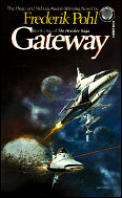
| Series: | Gateway #1 |
| Publisher: | Del Rey |
| Copyright: | 1976, 1977 |
| Printing: | January 1978 |
| ISBN: | 0-345-34690-4 |
| Format: | Mass market |
| Pages: | 313 |
While exploring the tunnels on Venus, apparently left by an alien civilization, a man stumbles across a ship with an automatic return mechanism, thereby discovering a previously unknown asteroid in an unusual orbit covered with the keys to the galaxy. Or at least the keys to a cramped tour to preselected points of the galaxy.
Gateway is a collection of spaceships, left behind by an alien race called the Heechee that apparently vanished millions of years ago. The ships can hold one, three, or five people at most, depending on the ship, can only accept one of a very large number of pre-set destinations, give no clue as to how long it will take to reach their destinations or what the other end will be like, and can automatically return to Gateway. Oh, and they can travel considerably faster than light, and no one understands how they work.
This is obviously an exploration opportunity unparalleled in the history of the human race, where great wealth is available to, well, whoever is foolhardy enough to risk the trip and lucky enough to find something interesting. In a badly overcrowded world, a few people, generally desperate and without much in the way of marketable skills, manage to pay for passage to Gateway, where they're given a crash course in basic survival training, charged for the air they breathe until they work up the courage to take one of the ships, and rewarded by the corporation that runs Gateway if they happen to come back with something interesting and live to tell about it.
This is the world background of Gateway, and it's marvelously well-executed. The story is surrounded by a fine mix of wonder, terror, and the sort of mundanity created by a rag-tag selection of fairly normal people, most of whom aren't heroes of any sort. The feeling of the world is enhanced throughout the book by little snippets of mission reports from returning ships, classified ads, and excerpts from lectures. It is a world inhabited by people who are refreshingly normal for SF exploration novels, who put off shipping out for months because they're simply scared out of their minds, who get drunk and gamble and have unsatisfying sex lives, who learn that spending three months in a ship large enough to barely hold three people is an exercise in frayed tempers and foul odors.
Unfortunately, while the strength of the book is the world background, the weakness is the main character. The book alternates each chapter between Bob Broadhead talking to his psychiatrist after his last Gateway mission and the story of what happened to him on Gateway, a layout that works only because with his psychiatrist, Bob is evasive, dishonest, and obnoxious, avoiding any discussion of what actually happened for as long as possible. He's a little better in the main story, but not by much. I was thoroughly sick of him by the end of the book, although the end does salvage and provide a little justification for his behavior. Bob is a very realistic sort of character, but just isn't a very likeable one.
While this is a BDO (Big Dumb Object) story, it's rather unusual for one. Most of the book deals with the characters and their interactions with each other, with Gateway only as the background and motivating force, and there are no dramatic revelations, discoveries, or changes to how Gateway works over the course of the story. I was left with an oddly slice of life feel; what happened was very important to Bob, but not really to many other people. That's not a bad thing, but it wasn't what I was expecting, and I wasn't quite interested enough in Bob to have it be fulfilling.
There is a great concept handled with unusual realism here, but not much of a punch. I didn't really enjoy spending time with the main character as much as I like in a book, and I wanted to learn more about the Heechee, how Gateway came about, and how everything worked. It's a good book for what it is, and I recommend it cautiously on the strength of the world-building and realism, but it's not a book I'm likely to re-read.
Followed by Beyond the Blue Event Horizon.
Reviewed: 2004-10-02